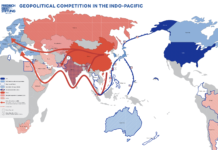Zulfqar Khan and Ahmad Khan
The peculiar nature of bilateral relations between the United States and China in space is the triggering point of a space security trilemma in South Asia. The spillover effect of a misperception-misunderstanding dynamic between the United States and China in outer space has brought strategic transformation between the bilateral relations among India-China, India-Pakistan, and China Pakistan, accentuating a security trilemma. All three states give high importance to their national space programs to achieve socio economic goals and to fulfil their national security needs. All three states also recognize the strategic importance of space as a new arena of war. However, the power asymmetry in South Asia has highlighted space-related capabilities as a potent medium of progress and power accumulation. As a result, the challenges in space have triggered and magnified the security trilemma for the South Asian rivals, interconnecting China, India, and Pakistan in the context of an international security complex.
The concept of a security trilemma was primarily conceived by Linton Brooks and Mira Rapp-Hooper in their scholarly work titled, ‘Strategic Asia 2013-2014: Asia in the Second Nuclear Age.’ Brooks and Rapp-Hooper argue that the concept is applicable to South Asia, where the three nuclear powers of China, India, and Pakistan interact in a triangular security matrix that is formed around the imperative of an offense-defence security environment. The theme of a security trilemma is based on the relations among India and Pakistan, China and India, China and Pakistan, and China and the United States.
South Asia has remained a region of concern for the international community, particularly for the United States in the past, and it is likely to remain so in the future. This reflects the importance of the South Asian region in the world politics and U.S. foreign security policy calculus, primarily due to its political, strategic, and economic significance, as well as the interests of other states associated with the region. The United States and India presently have a convergence of geostrategic interests in the region that has led to realignment of their strategic relations. On the other hand, the United States and Pakistan have unstable relations due to multiple factors, including the presence of U.S. and coalition forces in Afghanistan, and due to terrorism. The most interesting factor is U.S. rebalance policy in the region, which envisions containing the rise of China and where India is playing an instrumental role in helping the United States to achieve its strategic interests in the region. This constitutes a strategic chain reaction when China tries to balance its relations with the United States, which, in turn, negatively impacts its relations with India, which disturbs its relations with Pakistan. This causes a ripple effect in the bilateral relations between China-India, India-Pakistan, and China-United States.
Space is a strategic domain. It is also one of the most important global commons, most notably in the twenty-first century technologically driven security world where the future of geostrategic affairs is expected to be largely determined by the technological, cyber, and space capabilities of competing states. Strategically, space has become the fourth medium of warfare, in addition to land, sea, and air mediums. Concomitantly, space is analogous to these more traditional mediums. Overall, the strategic importance of space for the major powers has increased substantially since the launch of the first satellite into outer space in 1957. Hence,the value and reliance on space capabilities and their applications in the realms of communication networking, navigation, intelligence gathering, photographic reconnaissance, surveillance, and early warning purposes have increased manifold for the major powers and other state actors.
In the twenty-first century, states aspire to accumulate power and influence over economic, political, and technological areas, as well as military power and space power. All of this is considered synonymous with the symbols of power and prestige for technologically advanced states. The desire to gather power is akin to technological advancement. However, technological advancement cannot be achieved without exploration of space for peaceful, strategic, and military uses to achieve states’ national security goals. Space has strategic connotations for both spacefaring and non-spacefaring states because space related capability has emerged as a potent medium of progress and power. The uses of the global commons of space for various conflicting objectives are emerging as a potential cause of future conflicts. In addition, space politics at the global level among the major spacefaring states impacts international and regional security environments, particularly in South Asia. The ongoing space competition between the United States and China has created a space security trilemma for Pakistan and India. This is primarily due to international and regional geostrategic transformations that are rooted in the Indo-U.S. space and strategic partnerships. This, in turn, impacts the security dynamics of South Asia, and negatively affects Pakistan, which is at a power disadvantage in comparison to India.
The utilization of space power for states’ national defence has become an integral part of the national security strategy for India and Pakistan. In this regard, India is also focusing on expanding the orbit of its space program for national defence and power projection goals. This will prompt Pakistan to follow suit. The primary factor behind India’s growing space progress is partly due to its perceived fear of China’s expanding space program, and the latter’s growing militarization and weaponization capabilities. On the other hand, China’s primary concern is U.S. space weaponization capabilities. The concerns, vulnerabilities, and challenges in space trigger and magnify the security trilemma for these South Asian rivals, interconnecting China, India, and Pakistan in the context of an international security complex. This causes geopolitical dynamics and predicaments, such as China versus the United States, India versus China, and Pakistan versus India. Moreover, India has accelerated its space cooperation with the United States and other countries that will complement its BMD systems, which, from a Pakistani perspective, is a potent security threat and a destabilizing development that undermines the strategic stability of South Asia. Such developments place Pakistan under the sway of India’s increasing military and space dominance in the region. In sum, the space and technological programs of the United States, China, and India magnify the security trilemma between the regional states in South Asia.
Dr. Zulfqar Khan is the HoD of Strategic Studies Department, National Defence University, and Ahmad Khan is PhD scholar in the same department. The full article was published in the International Journal of Space Politics and Policy on 14th February, 2019.

















